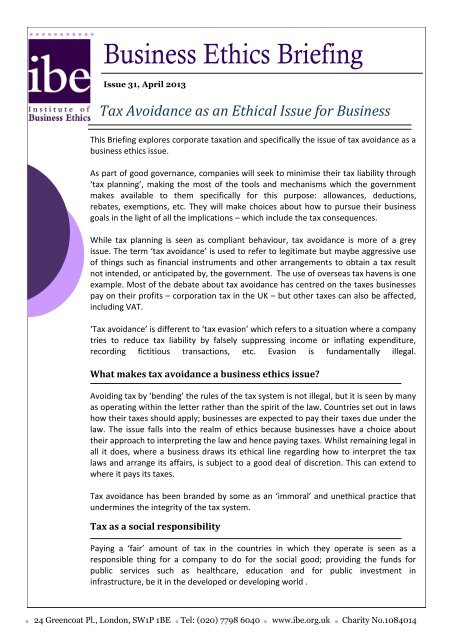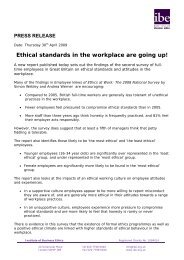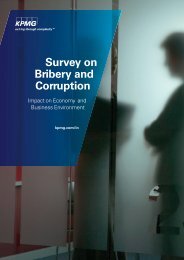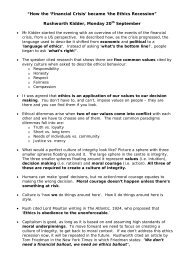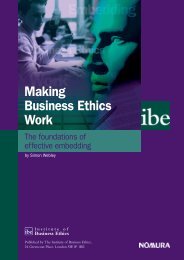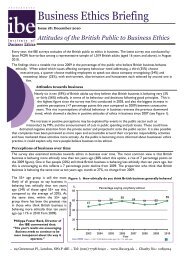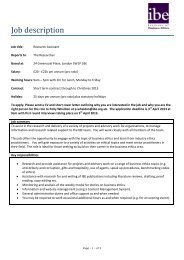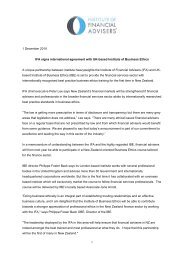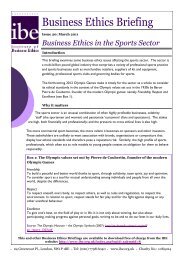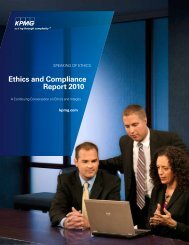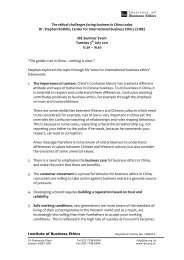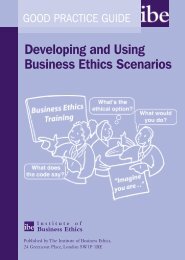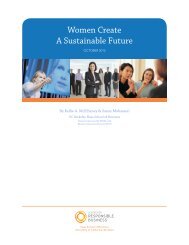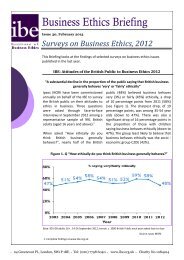Tax Avoidance as an Ethical Issue for Business - Institute of ...
Tax Avoidance as an Ethical Issue for Business - Institute of ...
Tax Avoidance as an Ethical Issue for Business - Institute of ...
Create successful ePaper yourself
Turn your PDF publications into a flip-book with our unique Google optimized e-Paper software.
<strong>Business</strong> Ethics Briefing<br />
<strong>Issue</strong> 31, April 2013<br />
<strong>Tax</strong> <strong>Avoid<strong>an</strong>ce</strong> <strong>as</strong> <strong>an</strong> <strong>Ethical</strong> <strong>Issue</strong> <strong>for</strong> <strong>Business</strong><br />
This Briefing explores corporate taxation <strong>an</strong>d specifically the issue <strong>of</strong> tax avoid<strong>an</strong>ce <strong>as</strong> a<br />
business ethics issue.<br />
As part <strong>of</strong> good govern<strong>an</strong>ce, comp<strong>an</strong>ies will seek to minimise their tax liability through<br />
‘tax pl<strong>an</strong>ning’, making the most <strong>of</strong> the tools <strong>an</strong>d mech<strong>an</strong>isms which the government<br />
makes available to them specifically <strong>for</strong> this purpose: allow<strong>an</strong>ces, deductions,<br />
rebates, exemptions, etc. They will make choices about how to pursue their business<br />
goals in the light <strong>of</strong> all the implications – which include the tax consequences.<br />
While tax pl<strong>an</strong>ning is seen <strong>as</strong> compli<strong>an</strong>t behaviour, tax avoid<strong>an</strong>ce is more <strong>of</strong> a grey<br />
issue. The term ‘tax avoid<strong>an</strong>ce’ is used to refer to legitimate but maybe aggressive use<br />
<strong>of</strong> things such <strong>as</strong> fin<strong>an</strong>cial instruments <strong>an</strong>d other arr<strong>an</strong>gements to obtain a tax result<br />
not intended, or <strong>an</strong>ticipated by, the government. The use <strong>of</strong> overse<strong>as</strong> tax havens is one<br />
example. Most <strong>of</strong> the debate about tax avoid<strong>an</strong>ce h<strong>as</strong> centred on the taxes businesses<br />
pay on their pr<strong>of</strong>its – corporation tax in the UK – but other taxes c<strong>an</strong> also be affected,<br />
including VAT.<br />
‘<strong>Tax</strong> avoid<strong>an</strong>ce’ is different to ‘tax ev<strong>as</strong>ion’ which refers to a situation where a comp<strong>an</strong>y<br />
tries to reduce tax liability by falsely suppressing income or inflating expenditure,<br />
recording fictitious tr<strong>an</strong>sactions, etc. Ev<strong>as</strong>ion is fundamentally illegal.<br />
What makes tax avoid<strong>an</strong>ce a business ethics issue?<br />
Avoiding tax by ‘bending’ the rules <strong>of</strong> the tax system is not illegal, but it is seen by m<strong>an</strong>y<br />
<strong>as</strong> operating within the letter rather th<strong>an</strong> the spirit <strong>of</strong> the law. Countries set out in laws<br />
how their taxes should apply; businesses are expected to pay their taxes due under the<br />
law. The issue falls into the realm <strong>of</strong> ethics because businesses have a choice about<br />
their approach to interpreting the law <strong>an</strong>d hence paying taxes. Whilst remaining legal in<br />
all it does, where a business draws its ethical line regarding how to interpret the tax<br />
laws <strong>an</strong>d arr<strong>an</strong>ge its affairs, is subject to a good deal <strong>of</strong> discretion. This c<strong>an</strong> extend to<br />
where it pays its taxes.<br />
<strong>Tax</strong> avoid<strong>an</strong>ce h<strong>as</strong> been br<strong>an</strong>ded by some <strong>as</strong> <strong>an</strong> ‘immoral’ <strong>an</strong>d unethical practice that<br />
undermines the integrity <strong>of</strong> the tax system.<br />
<strong>Tax</strong> <strong>as</strong> a social responsibility<br />
Paying a ‘fair’ amount <strong>of</strong> tax in the countries in which they operate is seen <strong>as</strong> a<br />
responsible thing <strong>for</strong> a comp<strong>an</strong>y to do <strong>for</strong> the social good; providing the funds <strong>for</strong><br />
public services such <strong>as</strong> healthcare, education <strong>an</strong>d <strong>for</strong> public investment in<br />
infr<strong>as</strong>tructure, be it in the developed or developing world .<br />
24 Greencoat Pl., London, SW1P 1BE Tel: (020) 7798 6040 www.ibe.org.uk Charity No.1084014
Page 2<br />
<strong>Tax</strong> avoid<strong>an</strong>ce <strong>as</strong> <strong>an</strong> ethical issue <strong>for</strong> business<br />
At a time when government spending cuts are having a real impact on the everyday lives <strong>of</strong> people,<br />
some say it is morally indefensible <strong>for</strong> multinational corporations be avoiding paying their fair share<br />
<strong>of</strong> UK taxes. Avoiding tax is avoiding a social obligation it is argued. Such behaviour c<strong>an</strong> leave a<br />
comp<strong>an</strong>y vulnerable to accusations <strong>of</strong> greed <strong>an</strong>d selfishness, damaging their reputation <strong>an</strong>d<br />
destroying the public’s trust in them.<br />
Comp<strong>an</strong>y directors will <strong>of</strong>ten argue, however, that their responsibility is to maximise the value they<br />
deliver <strong>for</strong> their shareholders <strong>an</strong>d that includes keeping tax costs to a minimum within the realms <strong>of</strong><br />
what is legal.<br />
Public attitudes<br />
It h<strong>as</strong> been widely alleged in the media that m<strong>an</strong>y multinational comp<strong>an</strong>ies, apparently operating<br />
very successfully in the UK, are paying little or no local corporation tax. In its latest estimate <strong>for</strong> 2010-<br />
11, Her Majesty's Revenue <strong>an</strong>d Customs (HMRC) put the tax gap figure at £4.1bn 1 . This is the<br />
difference between the amount <strong>of</strong> corporation tax actually collected <strong>an</strong>d the amount that should be<br />
collected if all comp<strong>an</strong>ies complied with ‘the spirit <strong>of</strong> the law’. Some campaigners believe that the<br />
real figure could be £12bn 2 or more. According to a 2011 ActionAid report 3 , 98 <strong>of</strong> FTSE100 comp<strong>an</strong>ies<br />
use tax havens to reduce their corporate tax bills. This h<strong>as</strong> attracted much negative media coverage<br />
<strong>as</strong> well <strong>as</strong> attention from campaign <strong>an</strong>d public interest groups such <strong>as</strong> UK Uncut <strong>an</strong>d the <strong>Tax</strong> Justice<br />
Network. The result is that corporate tax h<strong>as</strong> become a major business ethics issue (see Box 2).<br />
Public <strong>an</strong>ger over tax avoid<strong>an</strong>ce incre<strong>as</strong>ed in 2012, according to a survey <strong>of</strong> the British public by<br />
Christi<strong>an</strong> Aid 4 . It found that four out <strong>of</strong> five people agreed that tax avoid<strong>an</strong>ce by multinationals made<br />
them “feel <strong>an</strong>gry”. The survey also revealed that a third <strong>of</strong> Britons say that they are boycotting<br />
comp<strong>an</strong>ies which do not pay their “fair share” <strong>of</strong> tax in the UK. In a 2012 IBE survey carried out by<br />
Ipsos MORI, ‘tax avoid<strong>an</strong>ce’ w<strong>as</strong> the second most import<strong>an</strong>t ethics issue that the British public think<br />
business needs to address 5 . In spite <strong>of</strong> the contribution that they make in other ways to national<br />
economies, multinationals operating in developing countries (where large proportions <strong>of</strong> people live<br />
in poverty) have been met with much public disapproval <strong>for</strong> paying little or no corporation tax (e.g.<br />
Associated British Foods in Zambia) 6 .<br />
The governments which set the b<strong>as</strong>is <strong>of</strong> corporation tax have also been the target <strong>of</strong> public<br />
<strong>an</strong>noy<strong>an</strong>ce. Almost three-quarters <strong>of</strong> Christi<strong>an</strong> Aid’s survey respondents agree that government h<strong>as</strong><br />
a responsibility to ensure that all UK-b<strong>as</strong>ed comp<strong>an</strong>ies pay the proper amount <strong>of</strong> tax in every country<br />
in which they operate. 85% <strong>of</strong> survey respondents agreed that it w<strong>as</strong> currently “too e<strong>as</strong>y” <strong>for</strong><br />
multinational comp<strong>an</strong>ies in the UK to avoid paying tax 7 .<br />
These survey results perhaps suggest a need <strong>for</strong> government to pay more attention to explaining<br />
their position on this issue <strong>an</strong>d their interpretation <strong>of</strong> the law in order to bring more certainty <strong>for</strong><br />
1 HMRC figures reported http://bit.ly/T1mcTa. The tax gap figure includes a number <strong>of</strong> factors – e.g. ev<strong>as</strong>ion, error, hidden<br />
economy, legal interpretation <strong>as</strong> well <strong>as</strong> avoid<strong>an</strong>ce.<br />
2<br />
Richard Murphy <strong>of</strong> <strong>Tax</strong> Research UK: www.taxresearch.org.uk<br />
3 Available: http://bit.ly/qyztfi<br />
4 Full survey available: http://bit.ly/14WY5Mq<br />
5 More details <strong>of</strong> study available: http://bit.ly/T4JSaM<br />
6<br />
See http://bit.ly/13OMWwz<br />
7<br />
The current (April 2013) rate <strong>of</strong> UK corporation tax is 23% due to drop to 21% in 2014 <strong>an</strong>d to 20% in 2015. For comparison,<br />
Irel<strong>an</strong>d’s is 12.5% <strong>an</strong>d it is 0% in Bermuda, The Caym<strong>an</strong> Isl<strong>an</strong>ds, The Baham<strong>as</strong>, Bahrain, Guernsey, V<strong>an</strong>uatu <strong>an</strong>d the<br />
Isle <strong>of</strong> M<strong>an</strong>. The rate <strong>for</strong> the United States is 35%, Fr<strong>an</strong>ce 33.3% <strong>an</strong>d Belgium 33%.<br />
24 Greencoat Pl., London, SW1P 1BE Tel: (020) 7798 6040 www.ibe.org.uk Charity No.1084014
Page 3<br />
<strong>Tax</strong> avoid<strong>an</strong>ce <strong>as</strong> <strong>an</strong> ethical issue <strong>for</strong> business<br />
business. <strong>Business</strong>es themselves need greater internal engagement around the decisions <strong>an</strong>d<br />
circumst<strong>an</strong>ces behind their tax position. This then needs to be communicated externally, telling the<br />
story behind the business decisions that have lead to where <strong>an</strong>d how much tax h<strong>as</strong> been paid. This<br />
tr<strong>an</strong>sparency would help restore trust with the public.<br />
Fairness<br />
The public expects businesses to pay their ‘fair share’ <strong>of</strong> tax, which may not necessarily be the same<br />
<strong>as</strong> what the law requires or allows. What is a ‘fair’ amount is subjective. In 2008 HMRC declared that<br />
“we w<strong>an</strong>t to make sure that the burden <strong>of</strong> tax does not fall unfairly on taxpayers who play by the rules<br />
<strong>an</strong>d pay their fair share”; but it gives no definition <strong>of</strong> what is to be regarded <strong>as</strong> ‘fair’. The Association<br />
<strong>of</strong> Chartered Certified Account<strong>an</strong>ts (ACCA) acknowledges that it is difficult to define ‘fair taxation’ in a<br />
way that would satisfy all interested parties <strong>for</strong> all time.<br />
The consult<strong>an</strong>cy firm SustainAbility suggests a responsible <strong>an</strong>d ethical approach is to see tax “not <strong>as</strong> a<br />
cost to be avoided, but <strong>as</strong> a legitimate payment from wealth created to the countries <strong>an</strong>d communities<br />
that contributed to the wealth creation in the first place.” It states that tax policies should be<br />
underpinned by the guiding ethical principles <strong>of</strong> accountability, tr<strong>an</strong>sparency <strong>an</strong>d consistency. Its<br />
framework does not suggest that comp<strong>an</strong>ies pay more tax, but rather that they ensure tax<br />
contributions are a demonstrably fair return to society.<br />
Box 1: What tax rate is ‘fair’?<br />
The amount <strong>of</strong> tax paid depends on pr<strong>of</strong>it <strong>an</strong>d this c<strong>an</strong> be a factor <strong>of</strong> actual per<strong>for</strong>m<strong>an</strong>ce or the way<br />
that the pr<strong>of</strong>it is calculated. In 2011, the energy firm Centrica paid a tax rate <strong>of</strong> more th<strong>an</strong> 40% <strong>of</strong><br />
their pr<strong>of</strong>it in the UK. In contr<strong>as</strong>t, Google made £2.6bn <strong>of</strong> sales in the UK in 2012, yet contributed just<br />
£6m in corporation tax – a rate <strong>of</strong> less th<strong>an</strong> 0.3%. Starbucks sold nearly £400m worth <strong>of</strong> products in<br />
the UK, but paid no corporation tax at all 8 .<br />
<strong>Tax</strong> in codes <strong>of</strong> ethics<br />
It is good practice <strong>for</strong> comp<strong>an</strong>ies to have a clear <strong>an</strong>d tr<strong>an</strong>sparent statement regarding their position<br />
on payment <strong>of</strong> tax. For comp<strong>an</strong>ies that claim to operate according to a set <strong>of</strong> ethical values <strong>an</strong>d<br />
commitments, it is these values that would be expected to underpin such a statement.<br />
Some comp<strong>an</strong>ies do address tax <strong>as</strong> <strong>an</strong> issue or commitment in their code <strong>of</strong> ethics (or similar<br />
guid<strong>an</strong>ce). The majority only declare a commitment to avoiding illegal tax ev<strong>as</strong>ion <strong>an</strong>d abiding by the<br />
legal requirements <strong>of</strong> the countries within which they operate. Two examples <strong>of</strong> this are L’Oreal <strong>an</strong>d<br />
Old Mutual. Vodafone (who have been in the media accused <strong>of</strong> tax avoid<strong>an</strong>ce in the p<strong>as</strong>t) h<strong>as</strong> a st<strong>an</strong>dalone<br />
‘<strong>Tax</strong> Code <strong>of</strong> Conduct’ that states its commitment to paying what is legally required “in<br />
accord<strong>an</strong>ce with rules set by governments” <strong>an</strong>d that it is the government’s decision to decide what is<br />
a ‘fair’ amount <strong>of</strong> tax to pay. However, some, like Rolls Royce go further, to make specific reference to<br />
abiding by the ‘intention’ <strong>as</strong> well <strong>as</strong> the ‘letter’ <strong>of</strong> the law.<br />
Future developments<br />
Corporate tax avoid<strong>an</strong>ce will be <strong>an</strong> agenda issue at the G8 summit in June 2013. Prime Minister David<br />
Cameron h<strong>as</strong> pledged to use Britain’s presidency at the event to clamp down on multinational firms<br />
8<br />
See http://www.bbc.co.uk/news/business-20559791<br />
24 Greencoat Pl., London, SW1P 1BE Tel: (020) 7798 6040 www.ibe.org.uk Charity No.1084014
Page 4<br />
<strong>Tax</strong> avoid<strong>an</strong>ce <strong>as</strong> <strong>an</strong> ethical issue <strong>for</strong> business<br />
that avoid paying UK taxes.<br />
In the UK there is the proposed introduction <strong>of</strong> a General Anti-Abuse Rule (GAAR) intended to prevent<br />
those tax schemes that the government deems to be ‘abusive’ <strong>an</strong>d which David Cameron h<strong>as</strong><br />
described <strong>as</strong> “morally wrong”. However, some argue that the new legislation should be a wider <strong>an</strong>tiavoid<strong>an</strong>ce<br />
rule, though that raises difficulties over what is ‘re<strong>as</strong>onable’ behaviour, being subjective,<br />
not e<strong>as</strong>y to define <strong>an</strong>d creating too much uncertainty <strong>for</strong> business.<br />
M<strong>an</strong>y investing firms with a socially responsible m<strong>an</strong>date say they take account <strong>of</strong> comp<strong>an</strong>ies' tax<br />
practices when deciding where to invest but few actually screen out comp<strong>an</strong>ies over tax issues. One<br />
exception is the FTSE Group which h<strong>as</strong> said it w<strong>as</strong> looking into excluding comp<strong>an</strong>ies with what it called<br />
“overly aggressive tax reduction policies” from its ethical index, FTSE4Good. No timings have been<br />
confirmed on this move but the FTSE’s st<strong>an</strong>ce may reflect a future trend.<br />
Box 2: Examples <strong>of</strong> recent corporate tax stories in the UK press<br />
BBC News , 12 th November 2012 : Starbucks, Google <strong>an</strong>d Amazon grilled over tax avoid<strong>an</strong>ce<br />
Article Summary: All three multinationals have admitted to using favourable Europe<strong>an</strong> tax<br />
jurisdictions <strong>for</strong> their UK businesses in the p<strong>as</strong>t. Reuters revealed in late 2012 that Starbucks<br />
reportedly paid just £8.6m in corporation tax in the UK over 14 years - including reporting accounting<br />
losses when it w<strong>as</strong> pr<strong>of</strong>itable. According to a report by the Guardi<strong>an</strong>, Amazon generated sales <strong>of</strong> more<br />
th<strong>an</strong> £3.3bn in the UK in 2011 but paid no corporation tax on <strong>an</strong>y <strong>of</strong> the pr<strong>of</strong>its. Google's UK unit paid<br />
just £6m to the Tre<strong>as</strong>ury in 2011 on UK turnover <strong>of</strong> £395m, according to the Telegraph.<br />
Full story: http://www.bbc.co.uk/news/business-20288077<br />
The Guardi<strong>an</strong>, 9 th February 2013: British sugar gi<strong>an</strong>t caught in global tax sc<strong>an</strong>dal<br />
Article Summary: Claims that British FTSE 100 multinational Associated British Foods (ABF) h<strong>as</strong><br />
avoided paying millions <strong>of</strong> pounds <strong>of</strong> tax in the poverty stricken Afric<strong>an</strong> state <strong>of</strong> Zambia were made by<br />
Action Aid in February 2013. ABF’s subsidiary Zambia Sugar posted pre-tax pr<strong>of</strong>its <strong>of</strong> $123m between<br />
2007-2012 yet it paid less th<strong>an</strong> 0.5% in corporation tax to Zambia in the same period. Zambi<strong>an</strong> public<br />
services have lost <strong>an</strong> estimated $27m – enough to put 48,000 children in school, it is claimed.<br />
Full story: http://www.guardi<strong>an</strong>.co.uk/business/2013/feb/09/british-sugar-gi<strong>an</strong>t-tax-sc<strong>an</strong>dal<br />
The Telegraph, 8 th J<strong>an</strong>uary 2013: Major IT firms with government contracts accused <strong>of</strong> minimising<br />
corporation tax<br />
Article Summary: Technology comp<strong>an</strong>ies including IBM, Micros<strong>of</strong>t <strong>an</strong>d Dell are accused <strong>of</strong> paying<br />
little or no corporation tax despite recording billion <strong>of</strong> pounds <strong>of</strong> UK pr<strong>of</strong>its. There is no suggestion<br />
that <strong>an</strong>y <strong>of</strong> the comp<strong>an</strong>ies were breaking the law however their actions were br<strong>an</strong>ded “irresponsible,<br />
unethical <strong>an</strong>d unacceptable”.<br />
Full story: http://bit.ly/ZrgYTY<br />
This <strong>an</strong>d other <strong>Business</strong> Ethics Briefings are available to download free <strong>of</strong> charge from the<br />
IBE website: http://www.ibe.org.uk/index.<strong>as</strong>p?upid=51&msid=8<br />
24 Greencoat Pl., London, SW1P 1BE Tel: (020) 7798 6040 www.ibe.org.uk Charity No.1084014


